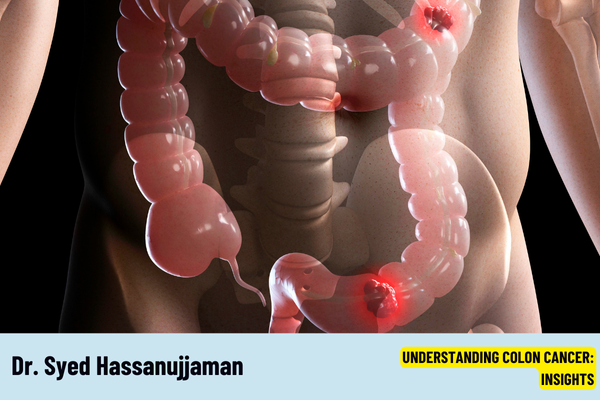Colon cancer, also known as colorectal cancer, is one of the most common types of cancer worldwide. It begins in the colon or rectum, which are parts of the large intestine. Early detection and treatment are crucial for improving outcomes. Dr. Syed Hassanujjaman, a leading surgical oncologist and cancer specialist in Kolkata, provides a comprehensive overview of colon cancer, discussing its symptoms, risk factors, and treatment options.
What is Colon Cancer?
Colon cancer originates in the lining of the colon or rectum. It typically starts as a small growth called a polyp, which can develop into cancer over time. Regular screening can detect these polyps before they become cancerous, making early intervention possible.
Symptoms of Colon Cancer
In its early stages, colon cancer may not cause noticeable symptoms. However, as the disease progresses, certain signs may appear, including:
- Changes in Bowel Habits: Persistent diarrhea or constipation, or a change in the consistency of your stool.
- Rectal Bleeding: Blood in the stool or rectal bleeding can be a warning sign.
- Abdominal Discomfort: Persistent cramps, gas, or pain in the abdomen.
- Unexplained Weight Loss: Losing weight without trying could be a symptom.
- Fatigue: Feeling weak or tired without a clear cause.
- Incomplete Evacuation: A feeling that your bowel doesn’t empty completely.
Dr. Syed Hassanujjaman emphasizes that these symptoms can be caused by conditions other than cancer, but if they persist, it’s important to consult a specialist for evaluation.
Risk Factors for Colon Cancer
Several factors can increase the risk of developing colon cancer:
- Age: Most cases of colon cancer occur in people over 50.
- Family History: A family history of colon cancer or polyps increases your risk.
- Diet: A diet high in red and processed meats and low in fiber may contribute to colon cancer risk.
- Lifestyle Factors: Lack of physical activity, obesity, smoking, and heavy alcohol use can increase risk.
- Inflammatory Bowel Disease: Conditions like Crohn’s disease or ulcerative colitis can elevate the risk of colon cancer.
Diagnosis and Treatment
Early detection of colon cancer significantly improves treatment outcomes. Screening methods like colonoscopy, fecal occult blood tests, and imaging scans help detect cancer at an early stage.
Treatment options for colon cancer include:
- Surgery: The primary treatment for localized colon cancer, surgery involves removing the cancerous part of the colon and nearby lymph nodes. Dr. Syed Hassanujjaman, as a top surgical oncologist, specializes in minimally invasive surgical techniques to reduce recovery time and improve outcomes.
- Chemotherapy: Often used after surgery, chemotherapy targets any remaining cancer cells and reduces the risk of recurrence.
- Radiation Therapy: This is sometimes used before surgery to shrink the tumor or after surgery to eliminate residual cancer cells.
- Targeted Therapy: For advanced stages, targeted drugs may be used to attack specific cancer cells without harming normal cells.
Conclusion
Colon cancer is a serious disease, but with early detection and appropriate treatment, the chances of a successful outcome are high. Dr. Syed Hassanujjaman, one of the best surgical oncologists in Kolkata, is dedicated to providing expert care for patients with colon cancer, offering advanced surgical techniques and comprehensive treatment plans.
If you or a loved one are concerned about colon cancer, it’s important to seek the advice of an experienced specialist. Dr. Syed Hassanujjaman is here to provide the expertise and support needed for your journey toward recovery.
